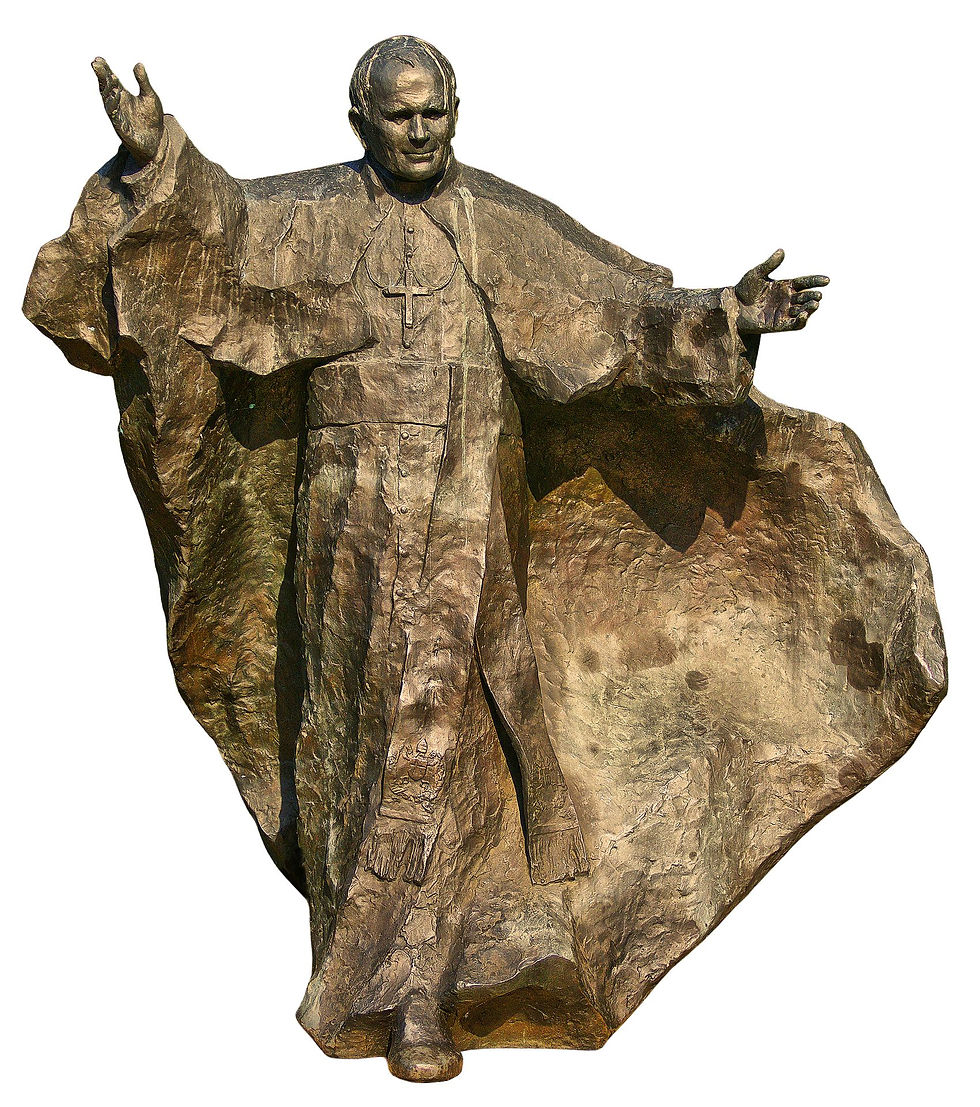Centenary year of the Feast of Christ the King; 23 November 2025
- Pauline Books & Media
- Nov 17, 2025
- 6 min read

The apostle Paul writes: "If death came through a man, through a man also the resurrection of the dead will come; and as in Adam all die, so in Christ all will receive life" (1 Cor 15:21-22). He adds: "Then the end will come, when he hands over the Kingdom to God the Father . . . For he must reign until he has placed all enemies under his feet. The last enemy to be annihilated will be death" (1 Cor 15:24-26).
Thus, then, Christ receives the Kingdom and, at the same time, He is given the task of offering it to us: the Kingdom of grace and truth, the Kingdom of justice, love and peace.
HOMILY OF JOHN PAUL II
Solemnity of Christ the King
Sunday, 24 November 1996
The institution of the Feast of Christ the King

"Therefore by Our Apostolic Authority We institute the Feast of the Kingship of Our Lord Jesus Christ to be observed yearly throughout the whole world on the last Sunday of the month of October - the Sunday, that is, which immediately precedes the Feast of All Saints."
Pope Pius XI
In 1925, Pope Pius XI instituted the feast of Christ the King. In his encyclical Quas Primas he wrote,
"It has long been a common custom to give to Christ the metaphorical title of "King," because of the high degree of perfection whereby he excels all creatures. So he is said to reign "in the hearts of men," both by reason of the keenness of his intellect and the extent of his knowledge, and also because he is very truth, and it is from him that truth must be obediently received by all mankind. He reigns, too, in the wills of men, for in him the human will was perfectly and entirely obedient to the Holy Will of God, and further by his grace and inspiration he so subjects our free-will as to incite us to the most noble endeavors. He is King of hearts, too, by reason of his "charity which exceedeth all knowledge." And his mercy and kindness which draw all men to him, for never has it been known, nor will it ever be, that man be loved so much and so universally as Jesus Christ. But if we ponder this matter more deeply, we cannot but see that the title and the power of King belongs to Christ as man in the strict and proper sense too. For it is only as man that he may be said to have received from the Father "power and glory and a kingdom," since the Word of God, as consubstantial with the Father, has all things in common with him, and therefore has necessarily supreme and absolute dominion over all things created.
"If the kingdom of Christ, then, receives, as it should, all nations under its way, there seems no reason why we should despair of seeing that peace which the King of Peace came to bring on earth - he who came to reconcile all things, who came not to be ministered unto but to minister, who, though Lord of all, gave himself to us as a model of humility, and with his principal law united the precept of charity; who said also: "My yoke is sweet and my burden light." Oh, what happiness would be Ours if all men, individuals, families, and nations, would but let themselves be governed by Christ! "Then at length," to use the words addressed by our predecessor, Pope Leo XIII, twenty-five years ago to the bishops of the Universal Church, "then at length will many evils be cured; then will the law regain its former authority; peace with all its blessings be restored. Men will sheathe their swords and lay down their arms when all freely acknowledge and obey the authority of Christ, and every tongue confesses that the Lord Jesus Christ is in the glory of God the Father."
That these blessings may be abundant and lasting in Christian society, it is necessary that the kingship of our Savior should be as widely as possible recognized and understood, and to the end nothing would serve better than the institution of a special feast in honor of the Kingship of Christ. For people are instructed in the truths of faith, and brought to appreciate the inner joys of religion far more effectually by the annual celebration of our sacred mysteries than by any official pronouncement of the teaching of the Church. Such pronouncements usually reach only a few and the more learned among the faithful; feasts reach them all; the former speak but once, the latter speak every year - in fact, forever. The church's teaching affects the mind primarily; her feasts affect both mind and heart, and have a salutary effect upon the whole of man's nature. Man is composed of body and soul, and he needs these external festivities so that the sacred rites, in all their beauty and variety, may stimulate him to drink more deeply of the fountain of God's teaching, that he may make it a part of himself, and use it with profit for his spiritual life."
QUAS PRIMAS
ENCYCLICAL OF POPE PIUS XI ON THE FEAST OF CHRIST THE KING
Luke 23:35–43
And the people stood by, watching, but the rulers scoffed at him, saying, “He saved others; let him save himself, if he is the Christ of God, his Chosen One!” The soldiers also mocked him, coming up and offering him sour wine and saying, “If you are the King of the Jews, save yourself!” There was also an inscription over him, “This is the King of the Jews.”

One of the criminals who were hanged railed at him, saying, “Are you not the Christ? Save yourself and us!” But the other rebuked him, saying, “Do you not fear God, since you are under the same sentence of condemnation? And we indeed justly, for we are receiving the due reward of our deeds; but this man has done nothing wrong.” And he said, “Jesus, remember me when you come into your kingdom.” And he said to him, “Truly, I say to you, today you will be with me in paradise.”
Homily, Saint Pope John Paul II, Sunday, 22 November 1998

"Jesus the Nazarene; the king of the Jews.". This is the inscription they had placed on the cross. Shortly before Christ's death, one of the two condemned men crucified with him said to him, "Remember me when you enter your kingdom." Which kingdom? The object of his request was, of course, not an earthly kingdom, but another kingdom.
The good thief speaks as if he had heard the conversation that had taken place earlier between Pilate and Christ. It was, in fact; before Pilate that Jesus had been accused of wanting to make himself king. Pilate had asked him about it: "Are you the king of the Jews? (Jn 18:33). Christ had not denied; he had explained: "My kingdom is not of this world; If my kingdom were of this world, my servants would have fought that I should not be handed over to the Jews; but my kingdom is not of this world" (Ibid., 18:36). To Pilate's renewed question as to whether he was a king, Jesus had replied directly: "You say, I am a king. This is why I was born and this is why I came into the world: to bear witness to the truth. Everyone who is of the truth hears my voice"(Ibid., 18:37).
The Good Thief crucified with Jesus came in some way to the heart of this truth. Indeed, in a certain sense he became a prophet of this eternal Kingdom when, hanging on the cross, he said: "Jesus, remember me when you come into your kingdom ". Christ said in reply: "Today you will be with me in Paradise ".
To this Kingdom, which is not of this world, Jesus invited us to look when he taught us to pray: "Thy Kingdom come". Obedient to his command, the Apostles, the disciples and the missionaries of all times have done their best to extend, through evangelization, the boundaries of this Kingdom. For it is both the gift of the Father and the result of man's personal response. In the "new creation", we will be able to enter into the Kingdom of the Father only if we have followed the Lord during our earthly pilgrimage.
This, then, is the programme of every Christian: to follow the Lord, the Way, and the Truth, and the Life, in order to possess the Kingdom which he has promised and given."
"When once men recognize, both in private and in public life, that Christ is King, society will at last receive the great blessings of real liberty, well-ordered discipline, peace and harmony."
Quas Primas, Pope Pius XI




Comments